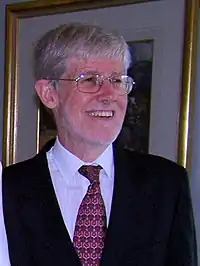Peter Davis (sociologist)
Peter Byard Davis (born 25 April 1947) is a New Zealand sociologist, professor, and the husband of Helen Clark, who was the Prime Minister of New Zealand from 1999 to 2008.
Peter Davis | |
|---|---|
 Davis in 2010 | |
| Spouse of the Prime Minister of New Zealand | |
| In role 10 December 1999 – 19 November 2008 | |
| Prime Minister | Helen Clark |
| Preceded by | Burton Shipley |
| Succeeded by | Bronagh Key |
| Personal details | |
| Born | Peter Byard Davis 25 April 1947 Milford on Sea, Hampshire, England |
| Nationality | New Zealander |
| Political party | Labour |
| Spouse | |
| Academic background | |
| Alma mater | University of Southampton (BA) London School of Economics (MSc) University of Auckland (PhD) |
| Thesis | A sociological analysis of the relationship between the formal and informal sectors of dental care in New Zealand (1984) |
| Academic work | |
| Discipline | Sociology |
| Institutions | University of Canterbury University of Otago University of Auckland |
| Website | University website |
Early life
Davis was born in Milford on Sea, Hampshire, England, on 25 April 1947,[1] and spent his childhood in Tanzania, where his father worked for a mining company.[2] His father was born in China and his mother in India, but a great-great-grandfather had grown up in New Zealand.[3] Davis gained a master's degree in sociology and statistics at the London School of Economics.[3] He moved to New Zealand in 1970 to work at the University of Canterbury[3] and completed a PhD at the University of Auckland.[2] He became a naturalised New Zealander in 1972.[1] He was part of a team investigating oral health in New Zealand and was joint editor of the Australian and New Zealand Journal of Sociology. In 1976 he was appointed a lecturer at the University of Auckland school of medicine.[4]
In 1980 he stood unsuccessfully for the Auckland City Council on a Labour Party ticket.[5]
Personal life
Davis met Clark, then a political-science lecturer at Auckland, in 1977[3] and they married in 1981.[6]
Career
Davis specialises in medical sociology, and from 2004 to 2017 worked as the Director of the COMPASS (Centre of Methods and Policy Application in the Social Sciences) Research Centre at the University of Auckland. He is now Professor Emeritus in the School of Population Health and Honorary Professor in the Department of Statistics at the University of Auckland.[7] Previously he served as Professor of Public Health at the University of Otago's Christchurch School of Medicine.
He has previously served on the Auckland Area Health Board, and was a representative in 1989 when his wife (Health Minister at the time) suspended that body. Davis has achieved international recognition in his field, having worked as a consultant for the World Health Organization.[8]
In 2019 Davis became a City Vision candidate for the Auckland District Health Board and was subsequently elected.[9]
He is Chair of The Helen Clark Foundation board.[10][11]
Notes
- "New Zealand, naturalisations, 1843–1981". Ancestry.com Operations. 2010. Retrieved 10 April 2017.
- Van Beynen, Martin (2006). "Davis's trouble and strife". The Press (23 September 2006): 7.
- Bain, Helen (1998). "The man called Mr Clark". The Dominion (21 December 1998): 8.
- "Appointed to Lectureship". The New Zealand Herald. 13 July 1976. p. 2.
- "Declaration of Result of Election". The New Zealand Herald. 29 October 1980. p. 9.
- Claudia Pond Eyley (2015). Helen Clark: Inside Stories. Auckland University Press. p. ix. ISBN 978-1775588207.
- "Professor Peter Davis". www.arts.auckland.ac.nz. The University of Auckland. Retrieved 2 September 2017.
- "Davis, Peter". us.sagepub.com. SAGE Publications Inc. Retrieved 3 February 2018.
- "Introducing the City Vision Health candidates standing for the Auckland DHB". cityvision.org.nz. City Vision. 28 July 2019. Retrieved 17 August 2019.
- "Think tanks are leading the way as political parties play it safe". Stuff. 22 December 2020. Retrieved 22 December 2020.
- "Our People - The Helen Clark Foundation". The Helen Clark Foundation. Archived from the original on 22 December 2020. Retrieved 22 December 2020.
References
- University of Auckland- press release
- Wayne Thompson: "PM's spouse eases long-distance stress" in The New Zealand Herald, Friday 6 February 2004
- University of Auckland profile
- Professores Emeriti of the University of Auckland
.jpg.webp)